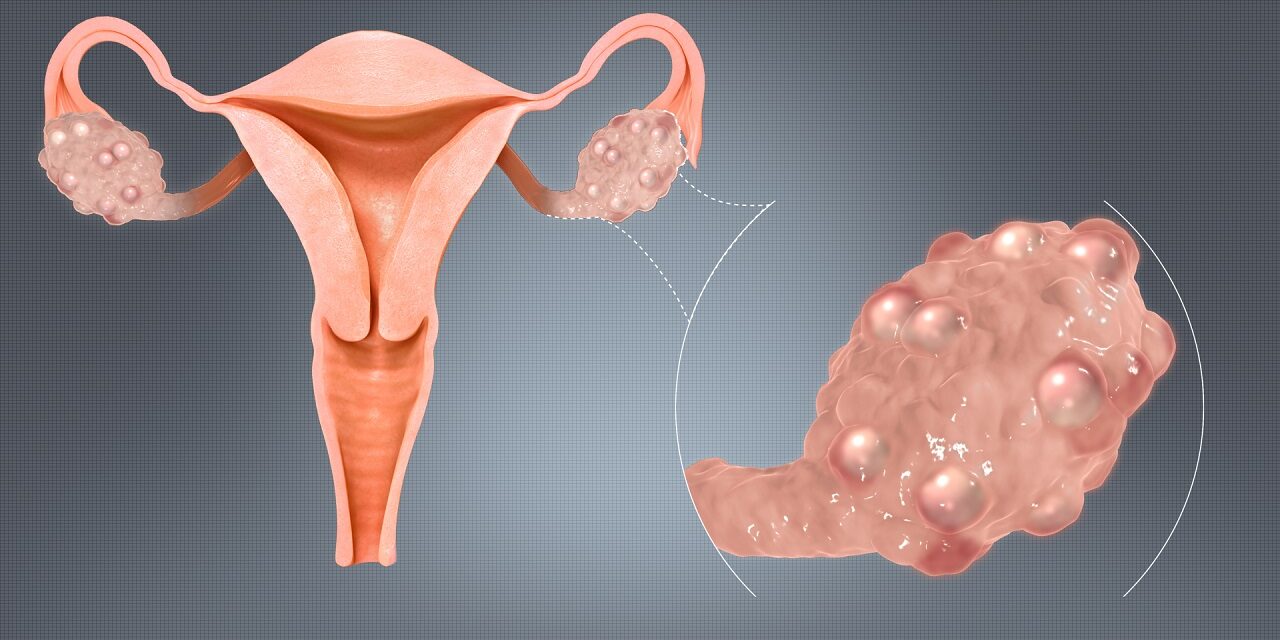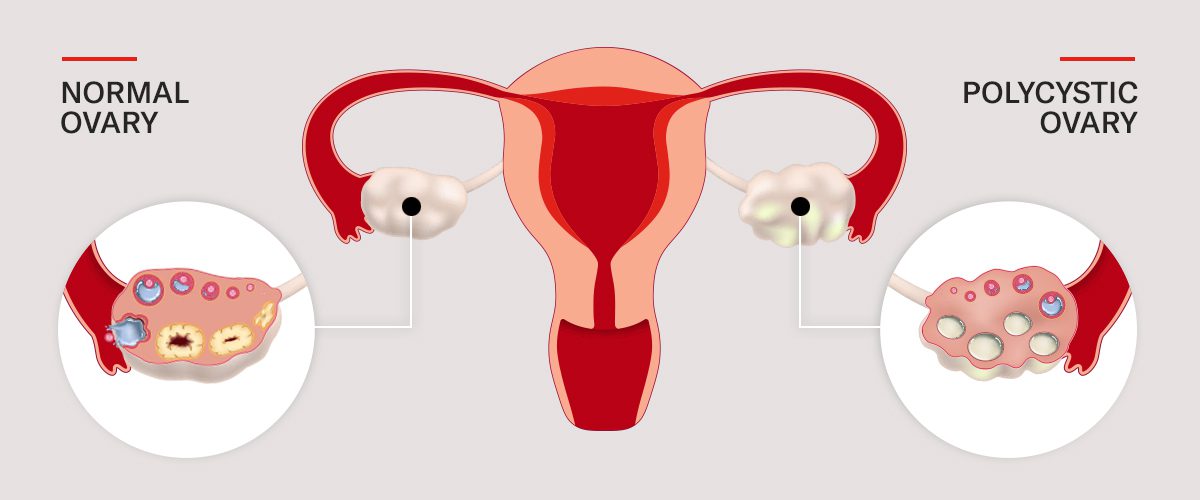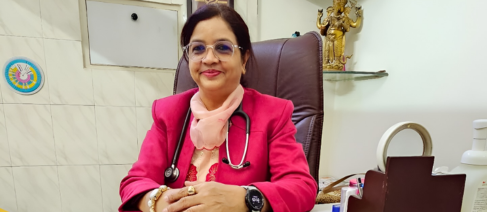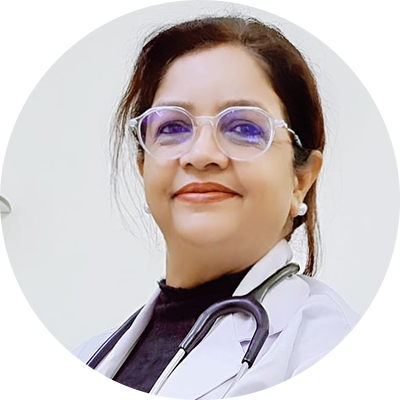Overview – PCOD Treatment in Delhi
Dr. Sadhana Gosain, a renowned gynecologist in Delhi with over 26 years of experience, specializes in the effective diagnosis and treatment of Polycystic Ovary Disorder (PCOD). Understanding the complex hormonal imbalances and diverse symptoms of PCOD, Dr. Gosain offers personalized treatment plans tailored to each patient’s unique needs. Using advanced diagnostic tools and the latest medical protocols, she focuses on restoring hormonal balance, regulating menstrual cycles, and improving fertility outcomes.


What is Polycystic Ovary Disorder (PCOD)?
The ovaries are vital reproductive organs in females that regulate the menstrual cycle and produce essential hormones such as estrogen, progesterone, inhibin, and relaxin. In Polycystic Ovary Disorder (PCOD), multiple immature eggs accumulate in the ovaries, causing them to swell. This leads to an increased production of male hormones (androgens), which can disrupt normal ovulation and often result in infertility.
PCOD is a common hormonal disorder affecting approximately 5-10% of women of reproductive age (12 to 45 years). The prevalence varies globally — in India, it affects about 9% to 22% of women, while in countries like China and Sri Lanka, the rates range between 2% to 7%.
This hormonal imbalance causes a range of symptoms including irregular or absent menstrual cycles, difficulty conceiving, weight gain, acne, and excessive hair growth (hirsutism). PCOD is also referred to as Polycystic Ovary Syndrome (PCOS). If left untreated, it can lead to serious health complications such as diabetes, obesity, cardiovascular diseases, and elevated cholesterol levels.
Common Symptoms of PCOD/PCOS
Polycystic Ovary Disease (PCOD), also known as Polycystic Ovary Syndrome (PCOS), often begins to show symptoms around puberty, near the time of the first menstrual cycle. However, it can also develop later in life, especially with gradual weight gain over the years.
Common signs and symptoms of PCOD include:
- Increased androgen levels: Elevated male hormone levels can cause excess facial and body hair (hirsutism) and male-pattern baldness or thinning hair.
- Irregular periods: Hormonal imbalances affect egg maturation, leading to irregular, delayed, or missed menstrual cycles.
- Difficulty conceiving: Disrupted ovulation caused by hormonal imbalance can make it harder to get pregnant. Many women are diagnosed with PCOD when they seek fertility treatment.
- Hair loss or thinning: Excess androgens can lead to noticeable hair thinning or hair fall.
- Acne: Hormonal changes may trigger persistent acne or oily skin.
- Weight gain: Many women with PCOD experience weight gain or struggle with weight management.
What Causes Polycystic Ovarian Disease (PCOD)?
Family History: PCOD can run in families, with up to a 50% chance of women developing the condition if their close female relatives have it. While no single gene causes PCOD, it is believed to result from multiple genetic factors. PCOD also increases the risk of Type 2 diabetes over time.
Insulin Resistance & Lifestyle: About 70% of women with PCOD experience insulin resistance, where the body’s cells do not effectively use insulin. This forces the pancreas to produce more insulin, worsening symptoms. Lifestyle factors such as being overweight or inactive further aggravate this condition. Genetic predisposition and poor diet also contribute.
Inflammation: Increased inflammation is common in women with PCOD, often worsened by excess weight. This inflammation is linked to higher levels of male hormones (androgens), which intensify PCOD symptoms.
Weight: Excess body weight exacerbates insulin resistance and makes PCOD symptoms more prominent. Some women may develop symptoms like irregular periods or excess hair growth only after gaining weight.
How is PCOD Diagnosed?
There is no single test to definitively diagnose PCOD. Your gynecologist will evaluate your medical history, conduct a physical exam, and recommend the following tests as part of PCOD Treatment in Delhi:
- Pelvic Examination: To detect physical signs of PCOD.
- Blood Tests: To measure hormone levels that may be irregular.
- Ultrasound: To look for cysts or changes in the ovaries typical of PCOD.
Regular follow-ups help monitor the condition and treatment progress.
Problems Associated with PCOD
PCOD can lead to several complications including:
- Metabolic syndromes: High blood pressure, cardiovascular disease, raised cholesterol, and blood sugar levels.
- Miscarriages and infertility.
- Gestational diabetes during pregnancy.
- Sleep apnea.
- Type 2 diabetes.
- Mental health issues like depression.
- Endometrial cancer and abnormal uterine bleeding.
- Persistent acne and hormonal imbalances.
- Chronic liver inflammation.
Studies show that by age 40, nearly 50% of women with PCOD develop pre-diabetes or diabetes, and many face infertility during their reproductive years.
PCOD Treatment in Delhi
While PCOD has no permanent cure, it can be managed effectively with the right treatment and lifestyle changes. A multidisciplinary team including gynecologists, endocrinologists, dietitians, infertility specialists, and dermatologists work together for comprehensive care.
Lifestyle Management:
Maintaining a healthy weight is crucial for PCOD Treatment in Delhi. Losing even 5% of body weight improves symptoms significantly. A balanced diet low in sugar and carbohydrates, rich in fiber and protein, alongside regular exercise, is recommended.
Medications:
- Birth Control Pills: Regulate hormones, reduce acne, and control excess hair growth.
- Progestin Therapy: Helps regulate menstrual cycles.
- Ovulation-Stimulating Drugs: Such as clomiphene, letrozole, and metformin improve fertility.
- Hair Growth Treatments: Medications like spironolactone or eflornithine help reduce unwanted hair.
Surgery:
For severe cases, laparoscopic ovarian drilling can be performed to stimulate ovulation by promoting egg release from the ovaries.
Diet Recommendations for PCOD Treatment in Delhi
A diet rich in natural, unprocessed foods helps control blood sugar and weight. Recommended foods include:
- Leafy greens like spinach and kale
- High-fiber foods such as broccoli, cauliflower, nuts, and legumes
- Fish and whole grains
- Low-fat dairy products
Best Exercises for PCOD Treatment
Reducing Body Mass Index (BMI) is key in managing PCOD. Effective exercises include:
- High-Intensity Interval Training (HIIT)
- Cardiovascular workouts
- Mind-body exercises like yoga and Pilates
- Strength and interval training
For expert PCOD Treatment in Delhi, Dr. Sadhana Gosain combines her 26+ years of experience with personalized care, advanced diagnostics, and holistic treatment approaches to help women manage PCOD effectively and improve their quality of life.
What is the Difference Between PCOD and PCOS?
PCOD (Polycystic Ovarian Disease) and PCOS (Polycystic Ovary Syndrome) are both conditions that affect the ovaries but differ in terms of severity, symptoms, and long-term health risks. Let’s explore the key differences between PCOD and PCOS:
PCOD vs PCOS: Key Differences
| PCOD | PCOS |
| Description: PCOD is a condition where smaller cysts form on the ovaries. These cysts are fewer in number and may shrink within a few months with lifestyle changes. | Description: PCOS is a metabolic disorder characterized by the growth of many cysts on both ovaries. This often leads to the ovaries not releasing eggs. |
| Prevalence: PCOD is common, affecting around 10% of women worldwide. | Prevalence: PCOS is less common, affecting about 0.2 to 2.5% of women globally. |
| Infertility Impact: Infertility in PCOD can often be managed with lifestyle changes and medications. | Infertility Impact: Infertility in PCOS is more severe, and even when pregnancy occurs, there’s a higher risk of miscarriage and complications. |
| Health Complications: PCOD usually doesn’t lead to serious long-term health issues. | Health Complications: PCOS can lead to serious health conditions such as diabetes, heart disease, high blood pressure, and even cancer. |
| Menstrual Cycle: Women with PCOD may experience regular or delayed periods. | Menstrual Cycle: Women with PCOS often experience delayed or stopped periods. |
Conclusion
There is no single clear cause of PCOD. However, early detection and diagnosis play a crucial role in relieving symptoms and minimizing potential complications. Effective PCOD Treatment in Delhi helps manage concerns such as infertility, hirsutism, acne, immature follicles, and obesity. Treatment typically involves a combination of lifestyle changes and medications tailored to each patient’s needs.
For more information about PCOD, or to explore the best options for PCOD Treatment in Delhi, book an appointment with Dr. Sadhana Gosain, one of the most trusted gynecologists in India. Learn about PCOD, its causes, symptoms, and the latest treatment methods.
Why Choose Dr. Sadhana Gosain for PCOD Treatment in Delhi?
Dr. Sadhana Gosain is a trusted expert with over 26 years of experience in providing effective PCOD treatment in Delhi. She offers personalized care that addresses the hormonal imbalances and symptoms unique to each patient. Using advanced diagnostic tools and a multidisciplinary approach, Dr. Gosain focuses on managing PCOD through lifestyle guidance, medical treatments, and fertility support when needed.
Her compassionate and patient-centric approach ensures you receive holistic care, improving your overall health and chances of conception. With Dr. Sadhana Gosain, you get expert guidance and continuous support throughout your PCOD treatment journey.
Frequently Asked Questions (FAQs) about PCOD Treatment in Delhi
While there is no permanent cure for PCOD, it is highly manageable. A healthy lifestyle, balanced diet, and regular exercise are key. Weight loss, insulin control, and restoring regular ovulation help manage symptoms. Medical treatments are available to regulate periods, improve fertility, and reduce acne and excessive hair growth.
PCOD happens when ovaries produce excess male hormones (androgens), causing irregular ovulation and cyst formation. Genetics and insulin resistance play important roles. Symptoms include irregular periods, difficulty conceiving, acne, and weight gain.
Managing PCOD involves maintaining a healthy weight, regular physical activity, and a low-carb, balanced diet to regulate insulin and blood sugar. Medical treatments like birth control pills and fertility drugs can help. Consult your doctor for personalized care.
PCOD and PCOS are related but slightly different. PCOD refers to cysts on ovaries and irregular ovulation; PCOS includes broader symptoms such as hormonal imbalances and metabolic issues. Both require appropriate treatment.
Bilateral PCOD means polycystic ovaries are present on both sides. It can cause irregular cycles, infertility, and hormonal imbalances and requires proper management through lifestyle, medications, or fertility treatments.
There’s no permanent cure, but natural remedies and lifestyle changes like exercise, a nutritious diet, and weight management significantly improve symptoms. Supplements such as omega-3, vitamin D, magnesium, and inositol may also help.
Focus on healthy lifestyle choices: regular exercise, a nutrient-rich low-glycemic diet, anti-inflammatory foods, and stress reduction techniques such as yoga or meditation.
Avoid high-carb, sugary, and processed foods that spike blood sugar and worsen insulin resistance. Instead, choose whole grains, fresh fruits, vegetables, and lean proteins.
Yes, irregular ovulation in PCOD can lead to infertility. However, with proper PCOD Treatment in Delhi, including fertility medications and lifestyle changes, many women successfully conceive.
Treatment varies but often includes hormonal medications (birth control pills), insulin-sensitizing drugs like metformin, fertility treatments, and lifestyle modifications. Consult your healthcare provider for the best plan.
If untreated, PCOD may cause diabetes, high blood pressure, endometrial cancer, heart disease, and metabolic syndrome. Regular monitoring and treatment reduce these risks.
Weight loss requires a low-carb, high-fiber diet combined with regular cardio and strength training exercises. Even a 5-10% weight reduction can significantly improve symptoms and hormone balance.

Meet Our Doctor
Dr. Sadhana Gosain is a trusted gynecologist and infertility specialist in Karol Bagh Delhi with over 26 years of experience. Practicing at Kumar Medical Center, she provides expert care in fertility, pregnancy, PCOD, menstrual disorders, cancer screening, weight management, contraception, and gynecological surgeries, offering compassionate and personalized women’s healthcare solutions.

Dr. Sadhana Gosain
MBBS,DGO (ICMCH) Gold Medalist PGDS Experience 26+ Years Trusted Gynecologist in Delhi
Book Your Appointment with Dr. Sadhana Gosain Today!
With over 26 years of expertise in gynecology and infertility, Dr. Gosain offers compassionate, personalized care tailored to your unique needs. Whether it’s fertility treatments, pregnancy care, or managing gynecological conditions, your health is our priority.
Book an AppointmentGet Expert Care for Every Gynecological Concern
Specializing in infertility, PCOD, pregnancy care, and women’s health, Dr. Gosain provides trusted, comprehensive care in Delhi. Book your appointment now for expert diagnosis, treatment, and ongoing support tailored just for you.
Contact us
